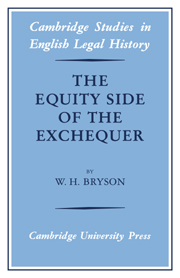Book contents
- Frontmatter
- Contents
- Preface
- Principal abbreviations
- Table of statutes cited
- 1 Introduction
- 2 The equity jurisdiction of the exchequer
- 3 The administration of the court
- 4 Procedures and records
- 5 The suppression of the jurisdiction
- Appendix 1 Chart showing the quantity of bills filed
- Appendix 2 Lists of officers
- Bibliography
- Index
5 - The suppression of the jurisdiction
Published online by Cambridge University Press: 07 October 2011
- Frontmatter
- Contents
- Preface
- Principal abbreviations
- Table of statutes cited
- 1 Introduction
- 2 The equity jurisdiction of the exchequer
- 3 The administration of the court
- 4 Procedures and records
- 5 The suppression of the jurisdiction
- Appendix 1 Chart showing the quantity of bills filed
- Appendix 2 Lists of officers
- Bibliography
- Index
Summary
The preceding chapters have discussed the jurisdiction, administration, and procedures of the exchequer in the sixteenth and seventeenth centuries. By 1700 the equity side of the exchequer was permanently established and its doctrines and procedures settled. In the eighteenth century the exchequer was fully accepted as an alternative jurisdiction to the chancery. As these two courts cited cases from each other as precedents, they gradually drew closer together. In addition, eighteenth-century legislation treated the two courts as equals; statutes dealt with them together as ‘courts of equity‘ rather than naming them and treating them separately. As the treasury became more important, the exchequer had less and less to do with the revenue affairs of the kingdom with the result that the barons became more and more concerned with their judicial duties. The revenue jurisdiction remained, but the administrative powers and duties over the public finances ceased to be centered upon the exchequer.
There were no major changes in the court's equitable jurisdiction during the eighteenth century; there was a continuous development, but this happened in the courts of chancery and exchequer in pan passu. Since there were no unique developments in the procedure of the exchequer in this period and since the procedure for this period has already been carefully described by Fowler, it only remains to consider the events of the nineteenth century, the state of the exchequer at that time, and the causes which led to the suppression of its equitable jurisdiction.
- Type
- Chapter
- Information
- The Equity Side of the Exchequer , pp. 160 - 166Publisher: Cambridge University PressPrint publication year: 1975

